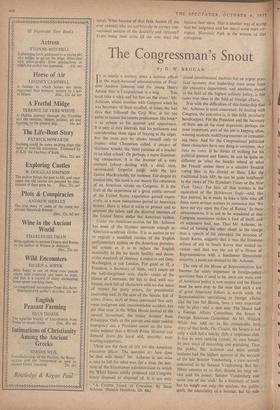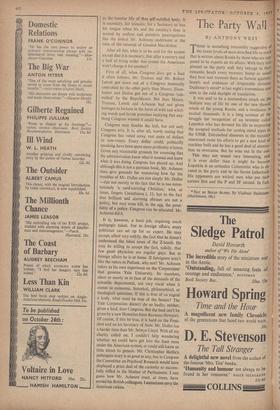The Congressman's Snout
By D. W. BROGAN
IT is nearly a century since a cabinet officer in the much-harassed administration of Presi- dent Andrew Johnson told the young Henry Adams that 'a Congressman is a hog. . . . You must take a stick and hit him on the snout.' Mr. Acheson, whose troubles with Congress when he was Secretary of State recalled, at times, the bad days that followed the Civil War, is far too polite to imitate his remote predecessor. His book* is as urbane as his manner and appearance. It is only at rare intervals that his politeness and consideration show signs of fraying at the edges. For the most part he allows himself only to display what Chesterton called, a pro pos of Matthew Arnold, the 'tired patience of a teacher in an idiot school.' Or perhaps, a more illuminat- ing comparison, it is the manner of a very eminent lawyer dealing with a deaf, vain, opinionated, forgetful jud6; with the late Justice MacReynolds, for instance. For despite its modest title, this book is not merely the comments of an American citizen on Congress. It is the fruit of the experience of a great public servant of the United States, experience gained expen- sively, at a most momentous period in American history. Here is what it takes to protect and to promote the safety and the external interests of the United States under the American system.
Under the American system, for Mr. Acheson has none of the illusions common enough in American academic circles. It is as useless to try to engraft a modified version of the English parliamentary system on the American presiden- tial system as it is to reduce the English monarchy to the no doubt healthy and demo- cratic standards of Norway. London is not Oslo; Washington is not London. For good or ill, .a President, a Secretary of State, can't count on the well-disciplined—nay, docile—ranks of the House of Commons. He has to deal with two houses, each full of characters with no due sense of respect for party orders, for presidential leadership and, in the case of the Senate, full of prime donne, each of them convinced that only some malignant and unaccountable accident has put 'that man' in the White House instead of the natural incumbent, the senior Senator from Pelissippia. Only in the gravest and most sudden emergency can a President count on the auto- matic support that a British Prime Minister can demand from his loyal and, possibly, even trusting supporters.
These are the facts of life for the American executive officer. The question is : how does he deal with them? Mr. Acheson i,s too wise a man to fall for what was, for a time, the doc- trine of the Eisenhower administration in which thp White House mildly proposed and Congress firmly disposed or disposed of. It is not only * A CnizeN LOOKS AT CONGRESS. By Dean Acheson. (Hamish Hamilton, 12s. 64.) sound constitutional doctrine but an urgent prac- tical necessity that leadership must come from the executive department, and nowhere, except in the field of the highest military policy, is this more true than in the field of foreign affairs.
It is with the difficulties of this leadership that Mr. Acheson is most concerned. In dealing with Congress, the executive is, in this field, peculiarly handicapped. For the President and the Secretary of State one of the most important, perhaps the most important, part of the job is keeping allies, winning neutrals, mollifying enemies or intimidat- ing them. And for the Congressional politician these characters have one thing in common; they have no votes. If he thinks of nothing but his political present and future, he can be quite in- different to 'what the Swedes intend or what the French' unless there is a sizeable Swedish voting bloc in his district or State. Like the traditional Irish MP, he can be quite indifferent to the views of The (London) Times or the New York Times. For him all that matters is the equivalent of the Skibbereen Eagle—and, like ' that journal, he is ready to take a little time off from more serious matters to announce that 'We have our eye upon the Czar of Russia.' In these circumstances, it is not to be wondered at that Congress sometimes makes a fool of itself, and an expensive fool, too. Thus Mr. Acheson, in- stead of turning the other cheek to the charge that a speech of his provoked the invasion of South Korea, suggests that it was the frivolous refusal of aid to South Korea that invited in- vasion—and that was the act of a House of Representatives with a handsome Democratic majority, a point not stressed by Mr. Acheson.
The role of the House of Representatives has become far more important in foreign-policy questions than it used to be, since one main arm of American policy is now money and the House must be won over to the view that such a use of good American dollars is worth while. So Representatives specialising in foreign affairs, like the late Sol Bloom, have a very important role to play—and a new one. The House had a Foreign Affairs Committee; the Senate a Foreign Relations Committee. As Mr. William White has told us in, his remarkable love story of that body, The Citadel, the Senate is not only a club but a touchy club, a suspicious club. It has its own ranking system; its own heroes; its own ways of rewarding and punishing. Thus the public, Mr. Acheson and most outside students had the highest opinion of the services of the late Senator Vandenberg, a view warmly concurred in by Senator Vandenberg. •But Mr. White conveys to us that, despite his long ser- vice and his. power, Senator Vandenberg was never one of the 'club.' So a Secretary of State has to weigh not only the wisdom, the public spirit, the educability of a Senator, but his role in the interior life of that self-satisfied body. It is necesSary, for in-stance, for a Secretary to bite his tongue when his and the country's time is wasted by endless and pointless interrogations like the ordeal Mr. Acheson underwent at the time of the removal of General MacArthur.
After all this, what is to be said for the system except that it is necessary, that after a century and a half of living under this system the Americans won't change it for another?
First of all, when Congress does get a load it often follows. Mr. Truman and Mr. Robert Lovett got more out of a Congress nominally controlled by the other party than Messrs. Eisen- hower and Dulles got out of a Congress 'con- trolled' by the Republicans. But then Messrs. Truman, Lovett and Acheson had not given hostages to fortune in the form of wild and whirl- ing words and lavish promises implying that any- thing Congress wanted it could have.
Congress may fumble the ball, but not only Congress errs. It is, after all, worth noting that Congress has voted . away vast sums of dollars to non-voters. Every dollar could, politically speaking, have been spent more profitably at home. Given any reasonable grounds for assuming that the administration knew what it wanted and knew what it was doing, Congress has played up. And although this is not a partisan book, Mr. Acheson does give grounds for wondering how far the troubles of Mr. Dulles are not simply Mr. Dulles —due not merely to the fact that he is too osten- tatiously 'a card-carrying Christian,' who, at times, forgets Corinthians i, 13, but to the fact that brilliant and alarming phrases are not a policy, but may even kill, in the egg, the possi- bility of a policy. Congress can be educated. Mr. Acheson did it.
It is, however, a hard job, requiring much pedagogic talent. For in foreign affairs, every politician can set up for an expert. He may accept, albeit very sulkily, the fact that he doesn't understand the latest news of the Z-bomb. He may be willing to accept the fact, sulkily, that few good physicists are regular guys. But in foreign affairs he is at home. If foreigners aren't like the voters in Podunk, why not? Mr. Acheson refers to his own experience on the 'Corporation' that governs Yale University. Its members, silent or nearly so in face of the demands of the scientific departments, are very vocal when it comes to economic, historical, philosophical, or theological questions. If this is true of so august a body, what must be true of the Senate? The Yale Corporation doesn't do so badly; neither, given a lead, does Congress: But the lead can't be given by a new Honorius from Ravenna-Newport. Of course, if this be true, it is hard on the Presi- dent and on his Secretary of State. Mr. Dulles has a harder time than Mr. Selwyn Lloyd. With all my charity called on, I couldn't help wondering whether we could have got into the Suez mess under the American system, or could still know so little about its genesis. Mr. Christopher Hollis's poltergeist story is as good as any, but in Congress the Committee on Psychical Research would have displayed a great deal of the curiosity so success- fully stifled in the Mother of Parliaments. I can guess how Mr. Acheson must, at times, have envied his British colleagues. I sometimes envy the American citizen.























































 Previous page
Previous page